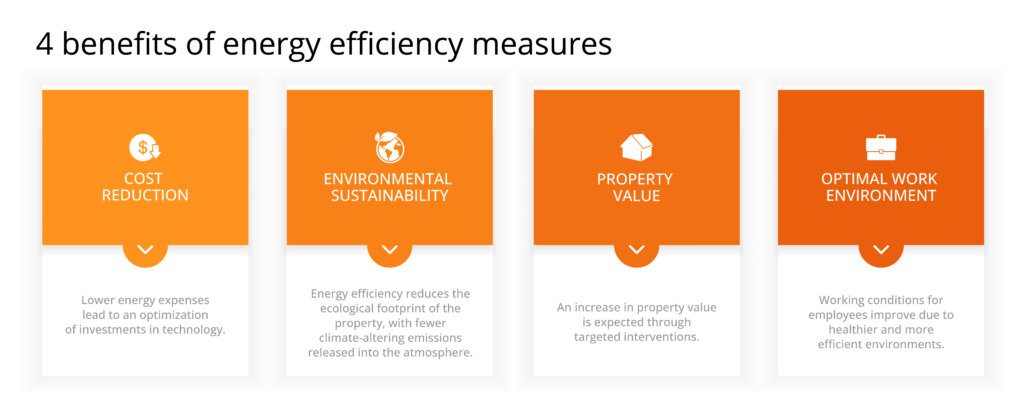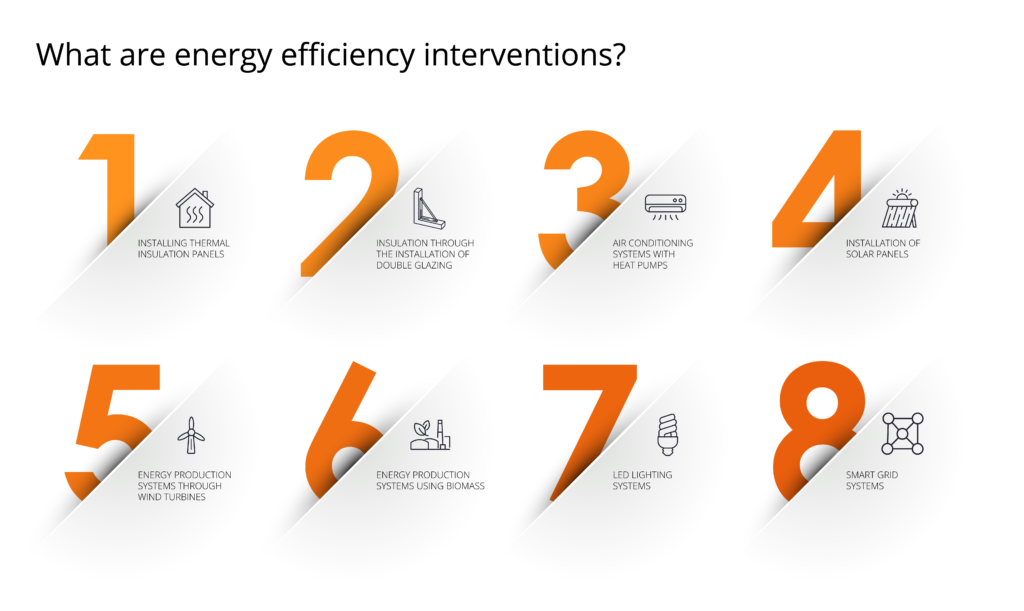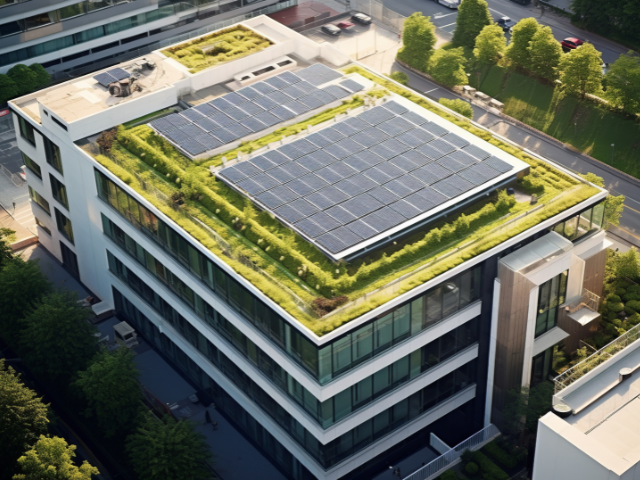Energy efficiency measures: 4 strategies for companies
In recent years, due to the increase in energy consumption and the consequent increase in CO2 emissions to the detriment of the environment, energy efficiency has become a central topic. In the European context that is spurring change, Italian companies are directing their resources towards sustainable interventions, starting with achieving greater energy efficiency, which is the ability to obtain the same energy required whilst reducing energy consumption.
How to achieve the same performance while consuming less energy and limiting as much as possible the use of polluting sources such as oil, coal and gas in favour of cleaner renewable energies? Through energy efficiency, a company can make better use of energy sources, benefiting the planet and its pockets. Let’s see how.
What is energy efficiency and why is it important?
Energy efficiency is a set of measures within a company that improve its energy efficiency, i.e. the ratio of emissions to energy needs. In other words, through energy efficiency operations, the company manages to make better use of energy sources, consuming less and helping the environment.
In addition to having a positive impact in terms of sustainability, energy efficiency is an investment that avoids waste while saving the company on its energy bill. From the insulation of walls or window frames to the installation of winter and summer air conditioning systems with heat pumps, to the installation of photovoltaic panels that allow energy to be produced through renewable sources, to the use of low-consumption lighting tools: here are the four strategic interventions to reduce energy use.
What are the benefits of energy efficiency?
Energy efficiency is not just an ESG (Environmental, Social, and Governance) issue; it represents a true strategic asset for companies. Among the main benefits ensured by energy efficiency measures:
- Cost reduction: Lower energy expenses lead to an optimization of investments in technology.
- Environmental sustainability: Energy efficiency reduces the ecological footprint of the property, with fewer climate-altering emissions released into the atmosphere.
- Property value: An increase in property value is expected through targeted interventions.
- Optimal work environment: Working conditions for employees improve due to healthier and more efficient environments.
A proactive approach to energy efficiency can therefore become a real competitive advantage for any business.

Energy efficiency for companies: 4 strategic interventions
In the pursuit of sustainable business practices, companies are increasingly recognizing the pivotal role of energy efficiency in reducing not only the operational costs but also their environmental impact. Let’s explore four strategic interventions that companies can undertake to enhance energy efficiency, starting with optimizing the energy consumption of buildings.
1. Thermal insulation to minimise heat loss
Fundamental energy efficiency measures for a company are those that optimise the energy consumption of a building, starting with its walls. Hence, thermal insulation is one of the most incisive operations. In this way, walls retain heat in the winter and reduce the influx of heat from the outside during the summer. As a result, the use of space heating or cooling systems is significantly reduced.
Not only insulation using thermal insulation panels, but also installing double glazing is a strategic choice to minimise heat loss from buildings. Heat pump air conditioning systems also fit into this directive. These devices regulate internal room temperature, taking the heat present in the environment and transferring it to the production environment, guaranteeing warmth in winter and coolness in summer.
2. Choosing clean and renewable energy
Another option for companies to lower energy consumption is to choose clean energy instead of fossil fuels that have created environmental damage over the years. Installing solar panels in a building to generate some of its own energy helps to lower energy costs, saving money and increasing the overall sustainability. Among the renewable energies that businesses can focus on, photovoltaics is not the only option. If a business is located on a windy site, it could take advantage of wind power, while for a business with biological waste elements, building a biomass-powered energy plant could be a winning solution.
3. Reducing the use of artificial lighting
A reduction in lighting usage can also drastically reduce overall consumption. Materials with high electrical conductivity or power lines running on direct current instead of alternating current, or even smart grids that reduce energy losses, are solutions that allow the lighting system to significantly reduce energy expenditure. Favouring more efficient lighting systems such as LED technology is particularly advantageous, especially in terms of replacement. Changing light bulbs to LEDs costs less and has less impact on the environment due to the high degree of recyclability compared to classic fluorescent or incandescent bulbs.
4. The importance of building management for energy efficiency
Finally, it is worth remembering that after working with design and construction choices aimed at improving efficiency, only appropriate building management and maintenance as a whole makes it possible to achieve the results set at the preliminary stage. Not only this, but constant monitoring of results helps the fine-tuning process and supports communication with stakeholders and externally.

What are the tax deductions for energy efficiency interventions by companies?
Companies that carry out energy efficiency interventions on their buildings can benefit from significant tax breaks. Among the most notable deductions are:
- Ecobonus: It provides a deduction of 65% of expenses incurred for thermal insulation, replacement of winter and summer air conditioning systems, and installation of solar panels.
- Renovation Bonus: It offers a deduction of 50% of expenses for the overall energy redevelopment of buildings through new fixtures and windows, solar shading, biomass heating systems, and new boilers with energy class starting from A.
- Seismic Bonus: It provides a deduction ranging from 75% to 85% for anti-seismic interventions carried out in conjunction with energy redevelopment interventions.
These tax benefits are a key incentive for all companies wishing to contribute to improving the energy efficiency of buildings and reducing environmental impact.
 English
English

